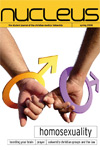'A 55-year old woman has come to hospital for investigations for anaemia and shortness of breath. She says she will kill herself if she is found to have cancer. The results confirm a malignant tumour. Do you risk her life by telling her she has cancer?' This case, an illustration in the book, would cause many a medic's heart to sink whether encountered in an exam or on the wards.
Starting with the reasons why the study of ethics is important for medical students, the authors then deconstruct common misunderstandings such as, 'religion should be kept out of medical ethics'. The next few chapters succinctly explain theories and values that inform modern ethics. There are summaries of the major religions as well as non-religious value systems like secular humanism (prevalent amongst medics). An understanding of other worldviews enables us, as Christians, to engage more effectively in dialogue and to explain our viewpoint.
Detailed chapters are based around Beauchamp and Childress' principles of beneficence, non-maleficence, autonomy and justice. Each one is clearly defined and illustrated with examples. Those of you who have studied ethics will be aware that the principles seem to contradict each other. Using clear diagrams and clinical vignettes, the authors show how some apparent contradictions can be resolved.
The chapters on Ethical Pathways guide the reader through an algorithm that can be applied to any ethical dilemma. This is important as it is impossible to give answers to every ethical problem in such a short book, and with the advancement of medical technology, new dilemmas will continue to challenge us! The algorithm is easy to follow and could be used by anyone. The authors stress that our values influence how we make decisions, so a Christian would have to explore other sources to determine their convictions before applying them to the pathway. For example, your view of when life begins will affect how you weigh the autonomy of the unborn against the beneficence to the existing child in the case of saviour siblings.
This book is aimed at medical students and junior doctors, although it is accessible to lay people. It is not limited to a Christian audience as it revolves around secular ethical principles. However, the authors are respected CMF members. Alan Johnson, recently deceased, was a surgeon, ethics lecturer and CMF President. Paul, his son, is a paediatric surgeon. Students I spoke to liked the clear layout, illustrations and chapter summaries. Making Sense of Medical Ethics does exactly what the title says.
Reviewed by:
Emma Hayward
Salaried GP and clinical educator in Leicester































